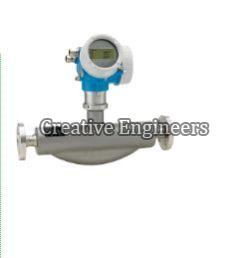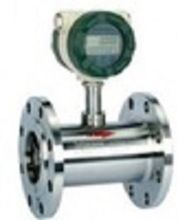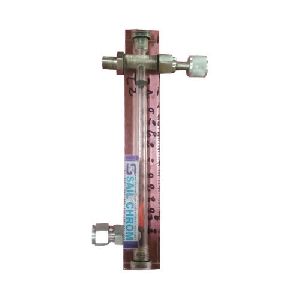
Gas Turbine Flow Meter
Get Price Quote
10 Piece (MOQ)

Gas Flow Meter
10,000 - 1,000,000 Per Piece
10 Piece (MOQ)
Gas flow meters measure the volumetric or mass flow rate of various gases. They come in different configurations to handle the specific properties of gases, such as low density, potential corrosiveness, and wide viscosity ranges. Here's a breakdown of typical specifications to consider when selecting a gas flow meter: General Specifications: · Flow Meter Type: Gas flow meters utilize various technologies, each with its advantages and limitations. Common types include: o Positive Displacement (PD) Meters: These trap a fixed volume of gas and count the number of times the volume is filled and emptied, providing accurate measurement for various gas types. Examples include oval gear, rotary vane, and nutating disc meters. o Thermal Mass Flow Meters: These meters directly measure the mass flow rate of gas by sensing the heat transfer between the gas flow and heated sensor elements. They offer excellent accuracy but can be more expensive. o Coriolis Flow Meters: These advanced meters measure mass flow rate by utilizing the Coriolis effect (vibration of a flowing mass). They provide high accuracy for various gases but are complex and costly. o Turbine Flow Meters: These meters use a rotor with blades that spins based on the flow rate of the gas. They are generally good for cleaner, less dense gases and offer good repeatability. o Ultrasonic Flow Meters: These meters use ultrasonic waves to measure gas velocity within a pipe. They can handle various gases, including those with entrained particles, but require careful consideration of pipe size and gas composition for accurate measurement. · Pipe Size: The diameter of the pipe the meter is designed for (e.g., 1/2 inch, 2 inch, etc.). Ensure it matches your pipeline diameter. Performance Specifications: · Flow Rate Range: The range of flow rates the meter can accurately measure. Select a meter with a range that covers your expected gas flow rates. · Accuracy: Expressed as a percentage of reading (% of reading) or reading plus/minus a fixed value. Typical accuracy for good quality meters is ±0.5% to ±2% of reading, with thermal mass flow meters offering higher accuracy. · Repeatability: The ability of the meter to produce consistent readings for the same flow rate. High repeatability is desirable for reliable measurements. · Pressure Rating: The maximum pressure the meter can withstand without failure. Ensure it meets the operating pressure in your system. · Temperature Rating: The range of temperatures the meter can function within without compromising performance. Consider both ambient and gas temperatures, as they can affect gas density and flow characteristics. Material Specifications: · Body Material: The material of the meter body, chosen for compatibility with the gas type, pressure rating, and potential corrosion resistance. Common materials include stainless steel, aluminum, and various alloys. · Wetted Materials: The materials of parts coming into contact with the gas, critical for compatibility to avoid contamination or degradation. Output Specifications: · Output Signal: The electrical signal the meter generates to represent the flow rate. Common options include: o Pulse output: Generates a pulse for each unit of volume or rotor revolution. The pulse frequency is proportional to the flow rate. o Frequency output: Outputs a continuous electrical signal with a frequency proportional to the flow rate. o Analog output: Provides a 4-20mA current loop or 0-10V voltage signal representing the flow rate. Additional Features: · Totalizer: A built-in function that accumulates the total volume of gas that has flowed through the meter over time. · Temperature Sensor (Optional): Some models include a temperature sensor to allow for temperature compensation and improve accuracy, especially for variable temperature applications. · Flow Conditioning (Optional): Certain applications may require flow conditioners upstream of the meter to ensure a smooth and consistent gas flow for accurate measurement. · Communication Protocols (Optional): Some advanced models offer communication protocols (e.g., Modbus) for remote monitoring and configuration. Factors to Consider When Selecting a Gas Flow Meter: · Gas Type: Identify the specific gas you'll be measuring (e.g., natural gas, compressed air, nitrogen) as this can influence flow meter selection and material compatibility. · Flow Rate Range: Select a meter with a range that comfortably covers your anticipated gas flow rates. · Accuracy Requirements: Consider the required accuracy level for your application. Thermal mass flow meters generally offer the highest accuracy. · Pressure and Temperature Rating: Choose a meter with pressure and temperature ratings exceeding your operating conditions. · Material Compatibility: Ensure the meter's body and wetted materials are compatible with your gas type to avoid issues. · Output Signal: Select an output signal compatible with your data acquisition system. · Additional Features: Consider optional features like a totalizer, temperature Additional Considerations for Gas Flow Meters (Continued) · Pipe Size: Ensure the chosen meter's pipe size rating matches your pipeline diameter. · Installation: Consider the ease of installation for the selected meter type. Some meters, like positive displacement meters, may require interrupting the flow for installation, while others like ultrasonic meters can be clamp-on for non-invasive installation. · Cost: Gas flow meters vary in price depending on technology, accuracy, and features. Consider your budget and prioritize features essential for your application. · Regulatory Requirements: In some industries, specific regulatory requirements might dictate the type of gas flow meter you can use. Here's a table summarizing the common gas flow meter types to aid selection: Flow Meter Type Advantages Disadvantages Typical Applications Positive Displacement (PD) Meters Accurate for various gases, good repeatability Can be bulky, pressure drop across meter, moving parts require maintenance Natural gas flow measurement, compressed air monitoring, industrial process control Thermal Mass Flow Meters Excellent accuracy, direct mass flow measurement Higher cost, sensitive to temperature variations Commercial and industrial gas flow measurement, emissions monitoring Coriolis Flow Meters High accuracy for various gases, mass flow measurement Most expensive option, complex technology High-value gas measurement, custody transfer applications Turbine Flow Meters Good for clean, less dense gases, simple design Lower accuracy for dusty or dirty gases Natural gas flow measurement, air flow monitoring in pneumatic systems Ultrasonic Flow Meters Non-invasive installation, handles gases with entrained particles Requires careful consideration of pipe size and gas composition, accuracy can be affected by gas properties Utility gas metering, biogas flow measurement
Best Deals from Gas Flow Meter

Digital Gas Flow Meter
25,000 Per Piece
1 Piece (MOQ)

Gas Turbine Flow Meter
Get Price Quote

Gas Flow Meter
48,000 Per Piece

Gas Flow Meter
Get Price Quote

Metal BPC Gas Flow Meter
Get Price Quote

Gas Flow Meter
Get Price Quote

Analog Gas Flow Meter
Get Price Quote

Gas Flow Meter
Get Price Quote
We are Offering Gas Flow Meter for all Types of Gas Flow and Consumption Measurment.

Laboratory Style Gas Mass Flow Meters/ Controller
Get Price Quote
Laboratory Style Gas Mass Flow Meters / Controller, btu meters

Gas Flow Meter
Get Price Quote
Gas Regulators

Gas Flow Meter
Get Price Quote
auto water level controller, Pressure Switch, Photocell, Nozzles